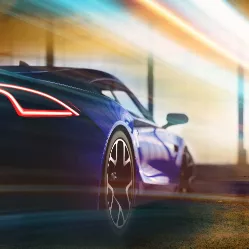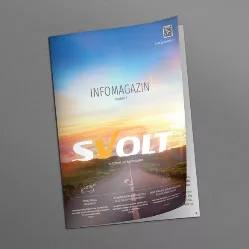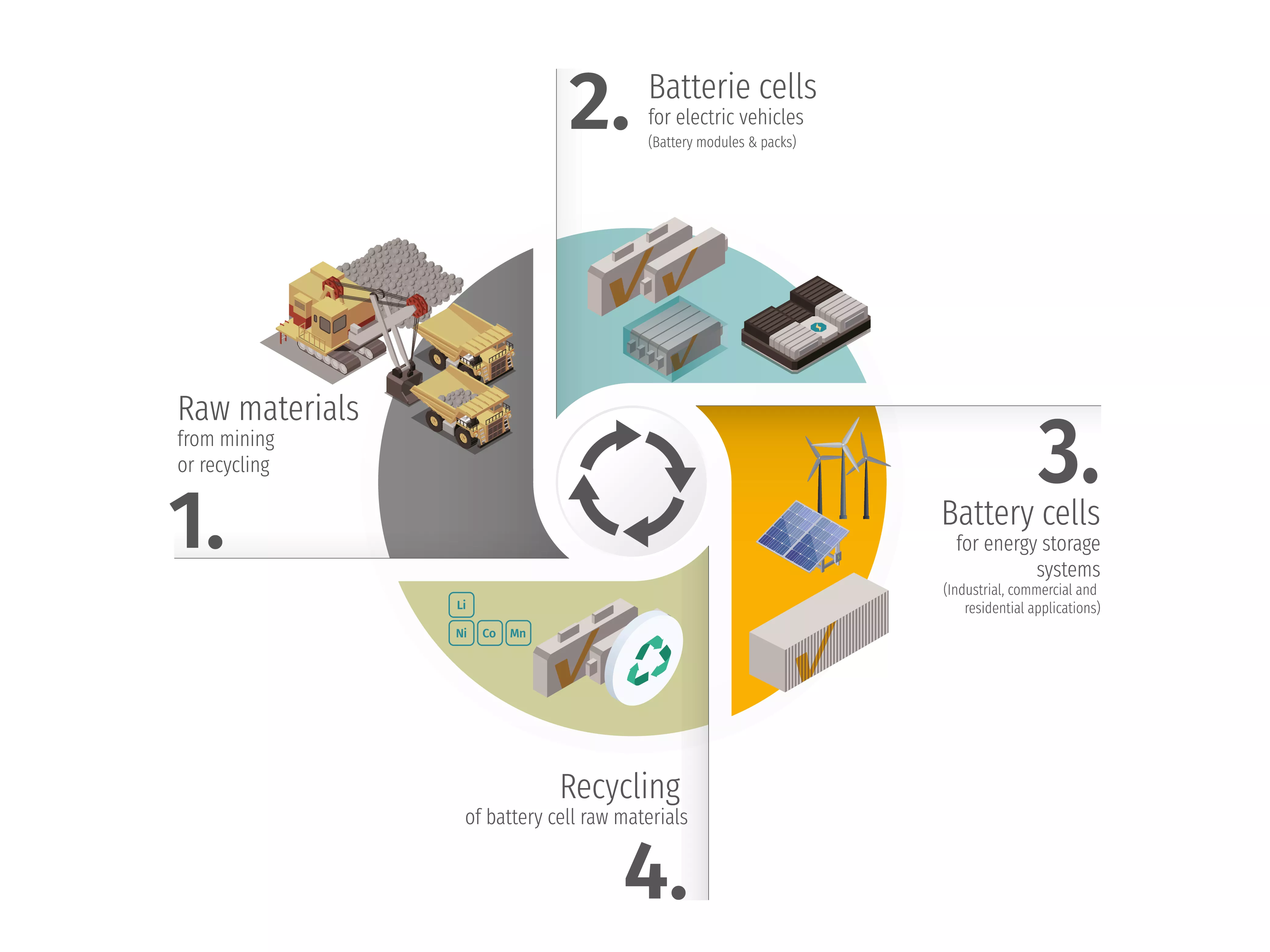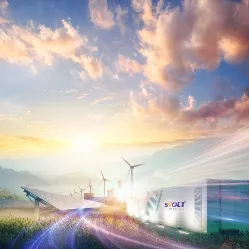Our holistic approach:
- Research & development
- Battery cell manufacturing
- Module & Pack
- Energy Storage Systems
- Software
- Sustainability
This approach leads to tailored solutions for each application and goes hand in hand with our ambition to drive the transformation of electromobility.
This makes SVOLT the perfect partner for automotive manufacturers: together we work to develop safe, need-based, cost-effective and durable products while contributing to a better future.

Tailor-made solutions for every application
Research & development
Striving for our goals, we never stand still, but drive innovation.
In order to offer our customers innovative battery systems and software solutions tailored to their specific requirements, SVOLT employs more than 3,000 people worldwide in research and development.
In addition to existing cooperations, we work closely with universities. Currently mainly in China. In the future, SVOLT also plans to work closely with German universities and research institutions.
Battery level: cell chemistry, cell design and cell manufacturing
Whether cell chemistry, cell design or cell production: Not all batteries are the same. As a systemic supplier, SVOLT develops and produces optimized lithium-ion batteries for the automotive sector as well as for the energy sector.
These include lithium iron phosphate (LFP) and lithium nickel cobalt manganese (NCM) batteries, as well as novel cobalt-free batteries (NMx). The latter manage entirely without the controversial heavy metal cobalt and are therefore not only much more sustainable, but also less expensive than high-nickel cells with conventional NCM cell chemistry (NCM811).
Depending on customer requirements, application and vehicle design, SVOLT offers a wide range of battery cell designs in the familiar shapes (prismatic, cylindrical and pouch). These include MEB and VDA standard products with top terminal design as well as L-type battery cells with side terminal design.
You want to know more about our product portfolio on battery level? Then click over to our english website now!
How is a battery cell manufactured?
Module & Pack
In addition to developments for customer projects, we also offer automotive standard systems at module level (MEB, VDA) as well as SVOLT-specific special solutionsas e.g. Cooling Plate Integrated Module (CPIM) and scalable battery systems (SBS).
We also develop cost- and weight-efficient battery packs for a wide range of vehicle types and sizes. In addition to solutions that meet global market standards, we offer pack designs based on proprietary module developments (CPIM and SBS).
In addition, we are actively working on module-free solutions such as Cell-to-Pack, which are already being implemented in initial customer projects.
You want to know more about SVOLT's products on the module and pack level?
How do modules and battery packs emerge from individual cells?
Energy Storage Systems
SVOLT's Energy Storage Solutions (ESS) address energy suppliers as well as industry, trade and private households.
The solutions are developed according to the latest design principles. The focus is on the attributes "safe", "strong" and "smart". Safety refers to the entire cell and the complete life cycle. In this respect, SVOLT ensures a continuous and smooth process - from production and delivery to operation and maintenance ("safe").
Would you like to learn more about SVOLT's Energy Storage Solutions?
Software solutions: BMS & AI
Car manufacturers of electric cars are facing many challenges. These include, for example, a lack of early warning systems, an insufficient data utilization rate and the thermal runaway of a battery.
In the future, car manufacturers will be able to analyze vehicle data using our SVOLT technology via the so-called "SVOLT Cloud Platform" and thus offer their customers additional services such as intelligent battery monitoring, smart after-sales service and accurate residual value analysis.
Want to learn more about SVOLT software solutions?
Sustainability
Ongoing climate change is forcing us to take action and adding complexity to the question, how we want to move from A to B in the most environmentally friendly way in the future.
The basic human desire for mobility must be reconciled with the need for a healthy environment worth living in, environment worth living in. Electromobility based on regenerative energy sources is seen as the key: It reduces CO2 emissions, lowers the impact of other pollutants and noise, and thus offers a better quality of life, especially in urban areas.
However, for theory to become practice, electromobility needs to be rolled out across the board. The leap from a high-priced luxury good to an affordable solution for the masses must be made.
At the heart of green mobility
The success of the transportation and energy transition stands, falls and rides with the heart of green mobility: modern, high-performance energy storage systems.
Nearly all established car manufacturers have recognized electromobility as the necessary strategic response to climate change. Electromobility is therefore one of the most important topics of the future today. This means: the higher the demand for electric vehicles, the more batteries will be needed.
But it is not only the automotive sector that is dependent on future-proof energy storage systems. The expansion of renewable energies, so-called green electricity, also calls for powerful storage technologies that can reliably compensate for fluctuations in the power grid. An independent energy supply that is available at all times also requires high-performance energy storage systems.
Lithium-ion batteries are considered a state-of-the-art solution due to their high energy density, performance and wide range of applications. This makes them particularly sought-after in the mobility and energy sectors.
Demand is very high and continues to grow at an enormous pace: for electromobility alone, it is estimated that global demand for battery capacities will increase to over 3,000 GWh by 2030. to over 3,000 GWh by 2030.
In Europe alone, production capacities of 400 GWh per year will be needed by 2028. This corresponds to batteries for more than five million e-vehicles per year. We also want to meet this demand, local-for-local.



Exciting stories and information about future technology, e-mobility and SVOLT can be found in the SVOLT info magazine! Click here to download the PDF:
Mission: Zero Emission!
At SVOLT, we don't just dream of nationwide, sustainable electromobility or an independent energy supply - we work every day to make it a reality.
We strive for transparent and, above all, sustainable production processes - from the mine to the recycling of battery systems. The aim is to use natural resources sustainably and responsibly and to ensure a closed resource cycle.
This is to be achieved with concrete measures across the entire supply chain, starting with increasing energy efficiency, using green electricity in the plants, and reusing and recycling lithium-ion batteries from electric vehicles.
We are also already actively working to make our solutions more environmentally friendly in the first use of the battery for e-vehicles: among other things, by completely eliminating the conflict mineral cobalt, which is otherwise used to stabilize high-nickel battery cells, from our nickel-manganese battery cell (NMX). This makes SVOLT the only company on the market to date that has succeeded in bringing a high-nickel cell chemistry without cobalt to industrial production maturity.
SVOLT launched an initiative at the end of July 2021 to reduce its carbon footprint over the entire battery lifecycle and meet the requirements of a sustainable industry. It also aims to drive the use of recycled raw materials. To this end, SVOLT has entered into a partnership with BASF, among others.
A comprehensive recycling concept for products that have reached the end of their product life cycle as well as scrap in the production process is also under development.
Energy Storage Systems
SVOLT also offers ESS solutions that contribute to an independent energy supply. Whether for commercial, residential or mobile use.
In addition, SVOLT attaches great importance to the second life cycle of the battery, after its use in the electric vehicle. This is because batteries that were installed in vehicles do not have to be recycled directly. They still have around 80 percent of their original capacity and can be used in other energy storage systems, for storing wind and solar power, for example. Only when they have reached the end of their life recycling measures take effect.

Conclusion:
The energy transition needs elctromobility. We are supplying the crucial technology of the future.
 Energy Storage Systems
Energy Storage Systems
Energy storage systems are suitable not only for utilities, but also for industry, commerce and private households. These include power plant technology in the large, medium and small segments as well as wind and solar energy, but also off-grid systems and applications for the residential segment (e.g. in residential buildings). They can also be used portably and contribute to independent energy supply while on the move.
Disused lithium-ion batteries from electric vehicles can also be reused in energy storage systems. Electric vehicles with modern battery systems currently achieve an average range of up to one million kilometers before they need to be replaced. This corresponds to an average service life of 15 to 18 years. When batteries are no longer powerful enough for use in electric vehicles, they can often be used in energy storage systems in a "second life" for several more years without any problems.


 Recycling
Recycling
Recycling in battery production refers to the recovery of valuable raw materials from a battery that can no longer be used as an energy storage device. Metals are recovered in a safe process to make them usable again as raw materials for battery production.
This process is absolutely necessary to recover the valuable ingredients of materials in battery systems at the end of their life cycle because: while raw materials are only available in limited quantities, the demand for lithium, cobalt and nickel is increasing significantly at the same time.
The existing mines can hardly cover this high demand for raw materials, which can lead to a veritable price explosion on the one hand and bottlenecks in the supply chain on the other.
Recycling leads the raw materials back into the production process and is indispensable. A holistically conceived life cycle and recycling strategy is needed for the battery cell industry. Increasing localization of the supply chain through recycling can likewise reduce costs and risks, thereby reducing the carbon footprint.
Therefore, we at SVOLT are already working with partners on sustainable concepts and solutions for recycling batteries and battery systems.



